Reforming electricity markets for low-cost and low carbon power
We are engaged in a programme of research examining options for reforming electricity markets, focusing on how a ‘Green Power Pool’ may be designed and operated.

2 July 2024
Jump to: Our publications | Original stakeholder reports
The problem with existing electricity markets
Electricity markets in Great Britain, the EU and many other parts of the world are based on short-run marginal costs, in which fossil fuels set the price (NECC #1). This design works well when the majority of generation is fossil fuel-based but becomes problematic with increasing levels of renewable generation. Renewables are capital-intensive but very cheap to run and have little or no ‘dispatchable’ response to short-run price fluctuations. Moreover, their average costs over the past decade or so have become far cheaper than fossil fuel-based electricity (NECC #3). This means that under current market arrangements, electricity consumers are paying much more than the average cost of generation (NECC #2).
The consequences of operating an electricity market with dated design became particularly acute during the recent energy crisis. Despite Britain generating much of its electricity from renewables, when gas prices soared, electricity prices followed, which triggered a cost-of-living crisis and inflation. British consumers, including those on ‘green’ tariffs, were unable to reap the benefits of our rapidly decarbonising electricity supply.
Our publications
In response, University College London, with support from the Aldersgate Group and the Institute for New Economic Thinking, partnered on a programme of research investigating electricity market reform, power sector decarbonisation, and measures to reduce electricity prices to facilitate the electrification of the UK economy.
Below you will find four working papers that outline the economic fundamentals of the UK’s electricity market design; present key principles for reform; examine the revenues collected by generators during the crisis; and put forward a vanguard proposal for a ‘Green Power Pool’, that would decouple gas and electricity prices, enabling consumers to benefit from the falling costs of renewable energy generation.
Alongside are our two stakeholder reports, ‘A zero-carbon power grid and the electrification of heavy industry: how to deliver on a twin challenge’, launched with the Aldersgate group on 27th April 2023, followed by a study of options for tariff reform, published on 19th September 2023.
Navigating the energy-climate crisis working papers

What is the role of natural gas in European electricity prices?
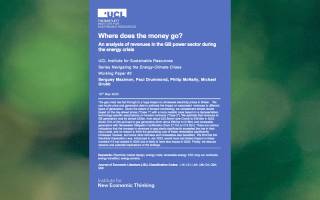
Where does the money go? An analysis of revenues in the GB power sector during the energy crisis
- Abstract – Working paper #1
This paper quantifies the role of fossil-fuelled vs. low-carbon electricity generation in shaping wholesale electricity prices across European countries, based on historical data using open, sub/hourly power system data between 2015-2021. We find that, despite a declining share in electricity generation, fossil fuels are still the main power plants “at the margin”, and hence setting the wholesale electricity price. With updated analysis, we find that averaged across Europe overall, in 2021 fossil fuels set the price about 58% of the time whilst generating only 34% of electricity per year. This was a slight decline from the values in 2019 (when fossil fuels set the price 66% of the time, with 37% of the generation).
However the trend in the UK was opposite: in 2021, gas set the electricity price 98% of the time, whilst generating just over 40% of electricity; non-fossil sources set the price the other 2% of the time. This was a marked change from the years 2015-2019, when gas set the price 80-90% of the time, with lower-cost imports through interconnectors setting the price for the rest. Overall, in 2021 fossil fuels set the electricity price more than 90% of the time in seven European countries, due to varied factors increasing the role of natural gas prices. As most of Europe (including the UK) imports most of its natural gas from outside Europe, this amplifies exposure of electricity prices to the geopolitical risks of gas supply, as well as the economic risks of currency exchange and natural gas price volatility.
- Abstract – Working paper #2
The gas crisis has fed through to a huge impact on wholesale electricity prices in Britain. We use hourly price and generation data to estimate the impact on associated revenues to different types of generators. Given the extent of forward contracting, we complement simple results based on the day-ahead prices (“Case 1”) with a more realistic case based on a representative, technology-specific assumptions on forward contracts (“Case 2”). We estimate that revenues to GB generators rose by almost £30bn, from about £20.5bn/yr (pre-Covid) to £49.5bn in 2022. About 70% of this accrued to gas generators (from about £6bn/yr to £19bn) and renewable generators with Renewable Obligation Certification (from £7.7bn to £15.5bn). There are various indications that the increase in revenues to gas plants significantly exceeded the rise in their input costs, and no reason to think the generating cost of these renewables significantly increased. Nuclear, and some other biomass and renewables also benefited. We find that the Electricity Generation Levy, introduced in Jan 2023, would have had limited impact on these numbers if it had existed in 2022 and is likely to have less impact in 2023. Finally, we discuss reasons and potential implications of the findings.
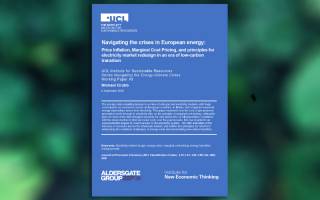
Price Inflation, Marginal Cost Pricing, and Principles for Electricity Market Redesign in an Era of Low-Carbon Transition
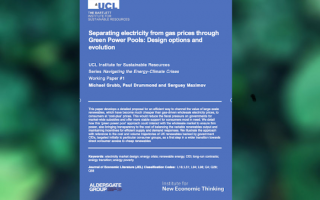
Separating electricity from gas prices through Green Power Pools: Design options and evolution
- Abstract – Working paper #3
The energy crisis engulfing Europe is a crisis of both gas and electricity markets, with huge cost impacts on consumers across all European countries. In Britain, half of typical household energy expenditure arises from electricity. This paper examines how the cost of gas-powered generation feeds through to electricity bills, on the principle of marginal cost pricing, setting the price for most of the time though it accounts for only about 40% of GB generation. Combined with the steep decline in wind and solar costs over the past decade, this has resulted in an unprecedented degree of ‘cost inversion’ in the electricity system. We offer estimates of the increase of revenues across the wholesale market, and outline five principles for reform for addressing the combined challenges of energy costs and accelerating low-carbon transition.
- Abstract – Working paper #4
This paper develops a detailed proposal for an efficient way to channel the value of large-scale renewables, which have become much cheaper than gas-driven wholesale electricity prices, to consumers at ‘cost-plus’ prices. This would reduce the fiscal pressure on governments for market-wide subsidies and offer more stable support for consumers most in need. We detail how this ‘green power pool’ approach could interact with the wholesale market to ensure firm power, also bringing transparency to the cost of balancing the variable renewables output and maintaining incentives for efficient supply and demand responses. We illustrate the approach with reference to the cost and volume trajectories of UK renewables backed by government CfDs, targeted initially to particular consumer groups, as a first step in a wider transition towards direct consumer access to cheap renewables.
Aldersgate / UCL Reports

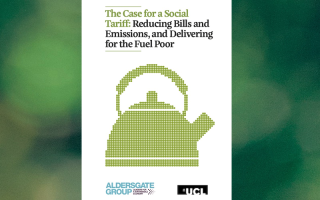
The case for a social tariff - reducing bills and emissions, and delivering for the fuel poor
The Green Power Pool
The Green Power Pool proposes to disentangle the current single wholesale electricity market into two: one appropriate to the economics of renewable generation (potentially including other zero carbon, high-capital but low-marginal cost generators), and one for traditional sources like fossil fuel-based generators. The market centred around renewables would involve long-term, fixed-price contracts for generation, based on their average rather than marginal cost of supply, with power sold directly to suppliers or consumers through long-term contracts. This would facilitate access to renewable electricity at a known and more stable price – much lower than currently available through the current single wholesale market, with collective purchasing of back-up and balancing services from the ‘on-demand’ fossil fuel-based wholesale market.
The underlying idea of a Green Power Pool was proposed in the 2018 report 'UK Industrial Electricity Prices: Competitiveness in a Low Carbon World', by Michael Grubb and Paul Drummond, and re-stated in the subsequent 2021 Policy Briefing 'Delivering Competitive Industrial Electricity Prices in an Era or Transition', both supported by the Aldersgate Group.
Original stakeholder reports
Electricity market design during the Energy Transition and the Energy Crisis – Issue 136
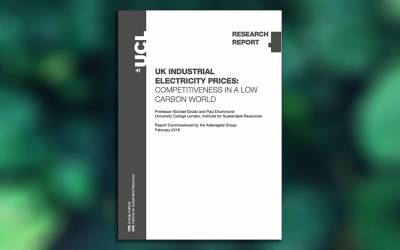 UK Industrial Electricity Prices: Competitiveness in a Low Carbon World
UK Industrial Electricity Prices: Competitiveness in a Low Carbon World
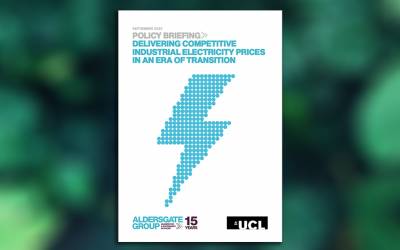 Delivering Competitive Industrial Electricity Prices in an Era of Transition
Delivering Competitive Industrial Electricity Prices in an Era of Transition
Photo credit: Kelly M Lacy / pexels.com
 Close
Close

